
By Curt Vandenberg | Fisheries and wildlife major
When I first came to University of Nebraska-Lincoln, it didn’t take long for me to hear about studying abroad. Between my advisors, emails, flyers, newspapers and class discussions, the idea of studying abroad was promoted and encouraged.
I thought going to Botswana to study conservation would be a great experience, but it seemed impossible for me to do. I didn’t have time to mess with study abroad when I was working and going to school simultaneously. Plus, money was obviously an issue; I couldn’t shell out thousands of dollars to go on a trip while I was paying for college. Besides, was I really going to learn anything out there, or was this going to be more like a vacation that I couldn’t afford to take right now?
So, I decided to ignore my advisors, the emails and the newsletters for the first semester.
When my second semester rolled in, I started hearing about study abroad again, especially traveling to Botswana. But after a year at Nebraska, I was more comfortable with the idea. So I looked more into it and went to a couple of meetings.
That’s where I met the eccentric John Carroll, the director of the School of Natural Resources. This guy was full of energy and life. He sold me on the trip. I figured the trip must be worth it if he’s this excited about it after going there every year for more than a decade.
The Trip
The focus of my study abroad was to learn about conservation in Botswana. We camped in tents for a month, during which time we went on hikes and safaris almost every day. During these activities, we learned how to identify plants and animals, track animals, and even drive four-wheel drive vehicles in very rocky terrain.
I can’t describe the difference between seeing an elephant or a cheetah in the zoo and seeing them in the wild. Even after seeing hundreds of elephants, I always wanted to see more. We had the privilege of witnessing a lion hunt down a warthog. Seeing a hunt like this on television does not do it justice.
We brushed up on our survival skills by learning to set up snares and building and sleeping in our own shelters. Of course, we had to be careful about the occasional elephant and lion wandering through camp at night; going to the bathroom at night will never be the same. We even experienced what it’s like working in the field by spending four days searching for an elephant with a collar, with the ultimate goal of removing that collar. And just when I thought there were no more surprises, we found a hyena den with babies just feet from the vehicle.
I can’t forget about the people I shared the experience with. Before this trip, I kept mostly to myself. I didn’t have time to join clubs and make new friends. I just wanted to get in and out. In Botswana, I had a whole month to get to know my fellow classmates. Some of them were people I had previously seen every week, but never bothered to say hi to.
Once you bond with someone in Botswana, there is no going back. Now, I’m able to laugh, share and learn next to those same people.
Funding
I hadn’t applied for scholarships before, so I wasn’t sure how to go about it. But my advisor convinced me to try it out. The Early Abroad scholarship was the first I applied for. I figured if I was awarded it, I had no reason not to go. This $2,000 scholarship was for students wanting to study abroad and were in their first two years at Nebraska. (Find more Nebraska study abroad scholarships here.)
I also applied for the Benjamin A. Gilman International Scholarship (Applications are due Oct. 4; apply here.).
This program aims to diversify the kinds of students who study and intern abroad and the regions where they go. If you receive Pell Grants, you most likely qualify for this scholarship. This scholarship alone paid for more than half my trip, but with both, my whole trip was paid for.
The process was much simpler than I imagined. I talked to my advisor as well as the financial aid and study abroad office, and they helped directed me to which scholarships I should apply for. After that, all I had to do is fill out some paper work and write a few essays. It took a while to get through all of it, but it was well worth it. If you’re willing to seek advice and have conversations with the right people, financial aid is available for anyone.
Why You Should Go
If you’re considering studying abroad, I highly recommend you do it. You may never have these chances again in your life time. I know money is usually the reason for many students who say “no” to studying aboard, but that’s why applying for scholarships are so crucial.
When I was debating applying for the Botswana trip, some people told me, “Just wait until after college when you have more money and a career!” After my travels, I realized this experience can’t be imitated by going on vacation. We weren’t just riding around in an off-road vehicle looking at animals in a touristy safari. We experienced Botswana up close and personal, as elephants snuck up behind us as we played volleyball in the river bed, as we tracked down lions that had strolled through our campsite in the middle of the night, or as we took late night population counts for hyenas.
The level of education you receive is equal to the amount of fun you have when you study abroad.
Study Abroad Opportunities
Get more information on study abroad opportunities at http://educationabroad.unl.edu/
More details at: http://snr.unl.edu